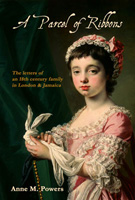The New Year is a time for good resolutions and at least one blogger I have read recently has promised to post more often. I’m conscious that I have not posted regularly in recent months and will try to do better in 2015.
I shall begin with a correction.
One feature of genealogy is that it is never done, and too often evidence emerges that shows conclusions drawn in the past, which seemed reasonable at the time, to have been wrong. So it was that I was contacted by someone researching the Scott family who challenged my assumption that their earliest ancestor in Jamaica had been the Rev John Scott who was presented to the parish of St Catherine on 14 March 1720 and married Elizabeth Millner (possibly the daughter of Elizabeth Rose of Mickleton) the following year. That John Scott died in November 1734 and so could not have been the father of the Scott brothers who grew up alongside the Lee family (see the book A Parcel of Ribbons).
In fact it seems clear now that the Scott family who were prominent in Jamaica from the mid-eighteenth century had come from Ballingarry in north Tipperary, Ireland where Jeremiah Scott (who had fought at the Battle of the Boyne in 1690) settled in the time of William III. Jeremiah’s son – yet another John Scott – had a large family of at least ten children many of whom were mention in the Will of their sibling the Hon. John Scott of Jamaica, proved in 1776.
This John Scott had brothers who ventured out across the colonies, Michael to Grenada, George to Dominica and Joseph to Nova Scotia. George, who was a professional soldier, was appointed Governor of Grenada but then left to be Governor of Dominica where he was killed in a duel in 1767. Michael seems to have remained in Grenada and by the time of his brother John’s death was still in dispute with him about George’s Will. Other brothers, and several sisters remained in Ireland.
Joseph Scott went to Canada where he built himself a delightful manor house at Fort Sackville, Bedford, Nova Scotia on land that had belonged to brother George. It is one of the oldest houses in Nova Scotia and is now a museum.
Joseph traded in a variety of goods, including rum which presumably came via his brother John in Jamaica. He also had huge timber holdings and he may well have traded lumber back to Jamaica in return. He imported butter from Ireland which was also a popular item traded into Jamaica, although its rancid flavour by the time it reached the tropics was an acquired taste!
This spreading out of a group of brothers from the British Isles is typical of what happened in many families during the eighteenth century. As time went on the next generation would be more inclined to look east towards India, Sumatra and China rather than west to the Caribbean and North America.
Joseph Scott’s family became well established in Canada and he died there in 1800 leaving a substantial fortune and over 8000 acres to his second wife Margaret.
John Scott married two wives in Jamaica adding considerably to his lands in the process. His first wife Frances Mary Henderson brought him lands in Clarendon but died giving birth to her namesake in November 1755. His second marriage to Lucretia Favell Gregory consolidated his dynastic credentials since her family included Gregorys, Gallimores and Favells, all early settlers.
By the time his son Jack Scott returned from education in England in the late 1780s to take over management of the family estates they were among the wealthiest on the island, albeit Sir George Nugent did not think much of him. The Scotts owned the Retreat and Kensington Park plantations in St Thomas in the East and Clarendon Park in Clarendon, but Sir George called him ” a silly, vain, chattering blockhead who…constantly blabs out all that passes in Council” (Lady Nugent’s Journal p.315). His brother George had settled to the life of a landed gentleman in England and Matthew had a distinguished naval career becoming a Vice Admiral in 1819.
All three Scott brothers married daughters of the plantocracy, but in Jack’s case not before he had fathered mixed race children with at least three women in Jamaica. Of his thirteen known children only five were legitimate (the last born posthumously in 1814 six months after his father’s death), whereas all thirteen of his brother Matthew’s were. The Scotts maintained close contact with the Lee family throughout their lives – Jack wrote regularly from Jamaica to Richard Lee, Matt Scott settled his family in Devonshire Place just around the corner from Frances Lee, and General John Lee named Matt Scott as one of his executors.
There have been distinguished Scott descendants down the years, but in recent times perhaps the most notable is Lt.-Cmdr. Desmond Edward Patrick Dehany Scott who claimed Rockall for the Crown in 1955!




